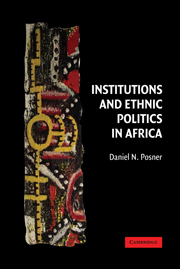Book contents
7 - Ethnic Campaigning
Testing the Observable Implications of the Argument for Elite Behavior
Published online by Cambridge University Press: 05 June 2012
Summary
In Identity in Formation, David Laitin writes that “ethnic entrepreneurs cannot create ethnic solidarities from nothing. They must, if they are to succeed, be attuned to the micro incentives that real people face” (1998: 248). Having identified the micro-incentives that Zambians face in Chapters 4 and 5, this chapter tests whether or not politicians are attuned to them. It investigates whether political elites behave in the way that the model would predict in each institutional setting.
The chapter is divided into three sections. In the first, I present evidence that politicians make different sorts of ethnic appeals in one-party and multi-party political campaigns: tribal in the former and linguistic in the latter. In the second, I show that the shift from multi-party to one-party rule alters parliamentary candidates' choices about the constituencies in which it will be most advantageous for them to run. Whereas running in a constituency where one is a member of the dominant tribe is of paramount importance in one-party elections, it is much less important in multi-party contests, since electoral success in those races is much more a function of a candidate's party affiliation than of his or her ethnic background. Drawing on information about the ethnic demographics of electoral constituencies and the tribal backgrounds of each of the more than 2,200 candidates that ran for Parliament between 1968 and 1999, I present a series of quantitative analyses that show that the different rules for what it will take to win leads candidates to choose to run in different kinds of constituencies in one-party and multi-party elections.
- Type
- Chapter
- Information
- Institutions and Ethnic Politics in Africa , pp. 179 - 216Publisher: Cambridge University PressPrint publication year: 2005

